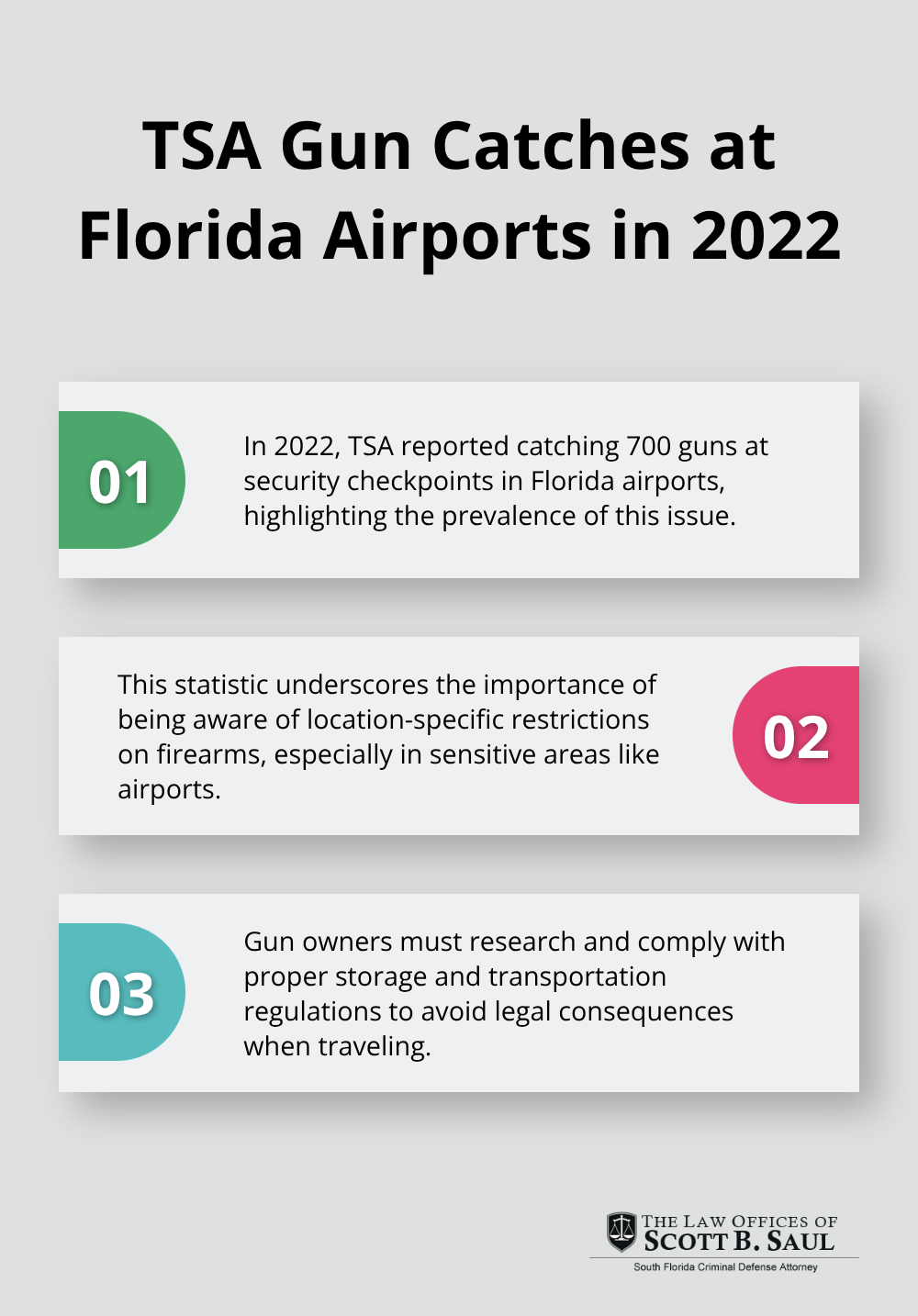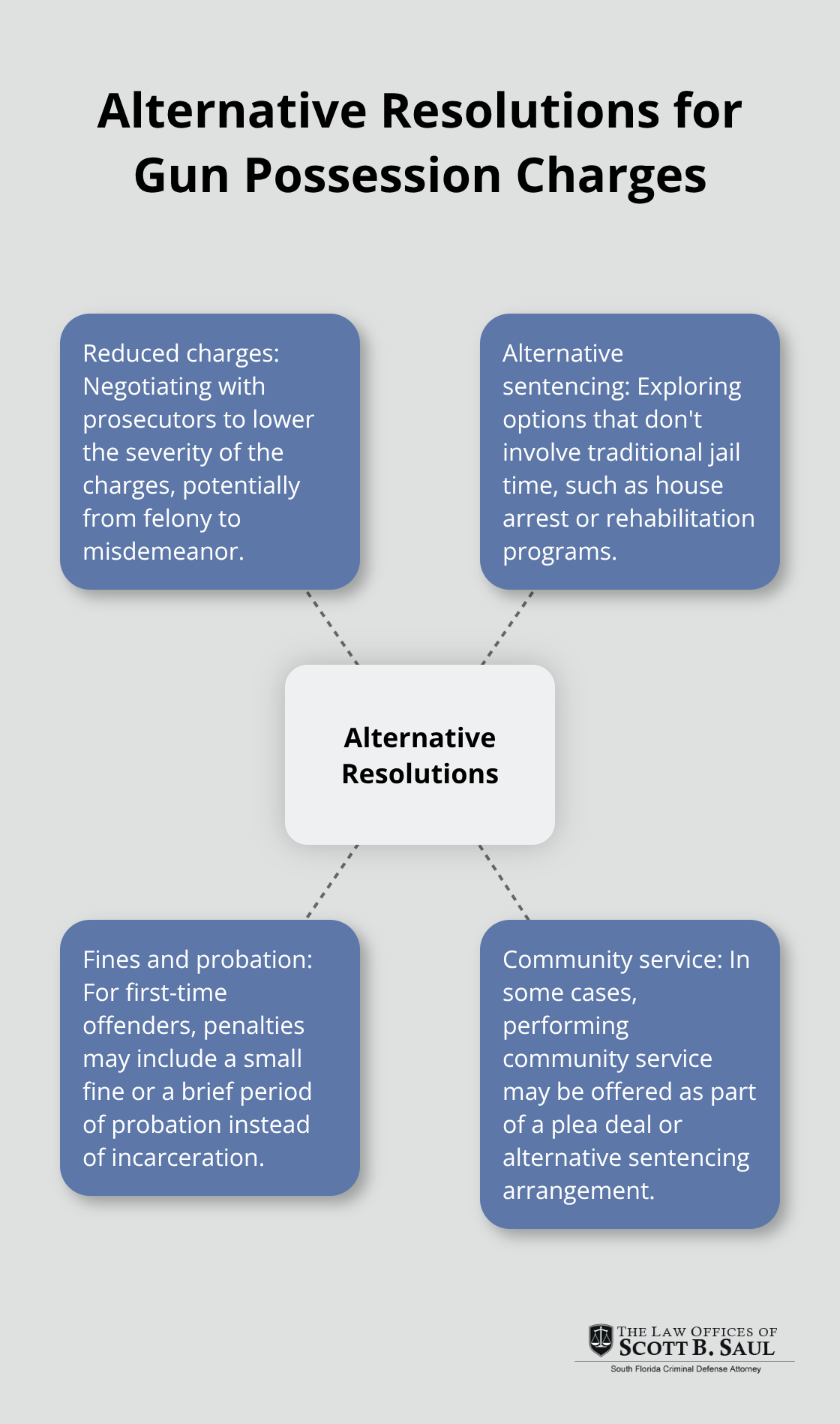How to Avoid Illegal Gun Possession Charges
By : saulcrim | Category : Criminal Defense | Comments Off on How to Avoid Illegal Gun Possession Charges
8th Sep 2025

At Law Offices of Scott B. Saul, we understand the complexities surrounding gun ownership in Florida. Navigating the state’s firearm laws can be challenging, and missteps can lead to serious legal consequences.
This guide aims to help you avoid illegal gun possession charges by outlining key regulations, common pitfalls, and effective defense strategies. Whether you’re a long-time gun owner or considering purchasing your first firearm, staying informed is your best protection against potential legal issues.
Understanding Florida’s Gun Laws
Florida’s gun laws stem from the Second Amendment of the U.S. Constitution, which protects the right to bear arms. However, this right comes with significant responsibilities and restrictions that every gun owner in Florida must understand.
Florida’s Stand Your Ground Law
Florida’s Stand Your Ground law provides immunity from criminal prosecution for individuals who use deadly force in self-defense. This means they cannot be arrested, detained, or charged with a crime if they reasonably believed it was necessary to prevent imminent death or great bodily harm. However, this doesn’t give carte blanche to use a firearm indiscriminately. The law requires a reasonable fear of immediate danger.
Concealed Carry Regulations
Florida operates as a “shall-issue” state for concealed carry permits. This means the state must issue you a permit if you meet the legal requirements. As of 2023, applicants must:
- Be at least 21 years old (unless you are a servicemember)
- Demonstrate competency with a firearm
- Pass a background check
It’s important to note that while Florida recognizes concealed carry permits from other states, not all states reciprocate. Always check the laws of your destination state if you plan to travel with your firearm.
Prohibited Locations for Firearms
Even with a concealed carry permit, numerous locations strictly prohibit firearms in Florida. These include:

Violations of these restrictions can result in serious legal consequences. Many individuals face charges simply because they lack awareness of these location-specific prohibitions.
The Importance of Legal Guidance
Understanding Florida’s gun laws proves essential for responsible gun ownership and avoiding legal troubles. If you ever feel uncertain about a specific situation or location, it’s always better to seek legal advice. Legal professionals can provide guidance on these complex issues and help you navigate the intricacies of Florida’s gun laws.
As we move forward, let’s examine some common scenarios that often lead to illegal gun possession charges and how you can avoid them.
Common Scenarios Leading to Illegal Gun Possession Charges
Misunderstanding Concealed Carry Laws
Florida’s concealed carry laws often confuse gun owners. Many individuals incorrectly assume that owning a gun permits them to carry it anywhere. This misconception can result in severe legal consequences. For instance, storing a loaded handgun in a vehicle’s glove compartment without a concealed carry permit is illegal in Florida. Such an oversight could lead to a third-degree felony charge (punishable by up to five years in prison and a $5,000 fine).
Ignoring Location Restrictions
Even with a valid concealed carry permit, certain areas prohibit firearms. These locations include government buildings, schools, and airports. In 2022, the Transportation Security Administration reported 700 guns caught at security checkpoints in Florida airports. Gun owners must research location-specific rules before carrying their firearms. When uncertain, it’s advisable to leave the weapon at home.

Improper Storage and Transportation
Florida law stipulates specific requirements for storing and transporting firearms. Firearms in vehicles must remain securely encased and not readily accessible for immediate use. This requirement means keeping guns in locked cases in the trunk, not loose under seats or in open glove compartments. At home, Florida’s safe storage law mandates that firearms be stored in locked containers or secured with trigger locks if minors could potentially access them. Non-compliance with these regulations can result in criminal charges, especially if a minor gains access to the firearm.
Possession by Prohibited Individuals
Federal and Florida laws prohibit certain individuals from possessing firearms. This group includes convicted felons, individuals subject to domestic violence restraining orders, and those adjudicated as mentally defective or committed to mental institutions. These prohibitions can sometimes catch people off guard. For example, a misdemeanor domestic violence conviction can result in a lifetime ban on firearm possession under federal law.
Understanding these common scenarios can help gun owners avoid illegal possession charges. However, the complexities of gun laws often require professional legal guidance. In the next section, we will explore effective legal defense strategies for those facing gun possession charges.
Effective Defense Strategies for Gun Charges
At Law Offices of Scott B. Saul, we employ powerful strategies to protect our clients’ rights when they face gun possession charges in Florida. Our approach combines legal expertise with tailored defense tactics to achieve favorable outcomes.
Challenging the Search and Seizure
One of our most effective strategies questions the legality of the search that led to the firearm’s discovery. Law enforcement must submit a sworn affidavit establishing probable cause to obtain a warrant. The warrant must clearly state the place to be searched and the items to be seized. If the search violates constitutional rights, we move to suppress any evidence obtained.
In a recent case, we argued successfully that a police officer’s warrantless search of a client’s vehicle during a routine traffic stop was unconstitutional. The judge agreed with our position, which led to the suppression of the firearm evidence and the dismissal of charges.
Proving Lack of Knowledge or Intent
We often demonstrate that the defendant was unaware of the firearm’s presence or did not intend to possess it illegally. This defense proves particularly useful in cases involving shared living spaces or borrowed vehicles.
Our team represented a client charged with illegal possession after police found a gun in his roommate’s closet. We presented evidence that our client had no knowledge of the firearm and no access to the locked closet (which was key to our defense). This strategy secured an acquittal for our client.
Establishing Lawful Ownership and Possession
For clients who legally own firearms, we focus on proving lawful possession. This involves presenting documentation such as valid permits, receipts, and registration papers. We advise our clients to keep these documents easily accessible and up-to-date.
In a recent case, we defended a client charged with illegal possession at a traffic stop. We quickly produced his concealed carry permit and proved he transported the firearm legally. This prompt action resulted in the charges being dropped before trial.
Negotiating Alternative Resolutions
First-time offenders may be offered a small fine or a brief period of probation, possibly involving community service. Our team negotiated a plea deal for a client facing felony charges for possessing a firearm in a prohibited location. We highlighted his clean record and demonstrated it was an honest mistake (factors that significantly influenced the outcome). As a result, we secured a misdemeanor plea with no jail time.

Final Thoughts
Florida’s gun laws demand constant vigilance and comprehensive understanding. Gun owners must know concealed carry regulations, location restrictions, and proper storage methods to avoid illegal gun possession charges. Professional legal guidance proves invaluable in navigating these complex laws.
Law Offices of Scott B. Saul offers expert criminal defense for gun-related charges in South Florida. Our team provides personalized attention and aggressive representation to protect our clients’ rights. We have over 30 years of experience and a strong track record of success (which sets us apart in the field).
Gun laws can change, so staying updated is essential for responsible ownership. If you face gun-related charges, seek professional legal representation immediately. The right defense strategy can lead to reduced charges, alternative sentencing, or case dismissal.
Archives
- October 2025 (8)
- September 2025 (9)
- August 2025 (8)
- July 2025 (8)
- June 2025 (9)
- May 2025 (9)
- April 2025 (8)
- March 2025 (9)
- February 2025 (8)
- January 2025 (9)
- December 2024 (10)
- November 2024 (5)
- July 2024 (2)
- June 2024 (2)
- May 2024 (2)
- April 2024 (2)
- March 2024 (2)
- February 2024 (2)
- January 2024 (2)
- December 2023 (2)
- November 2023 (2)
- October 2023 (2)
- September 2023 (2)
- August 2023 (1)
- July 2023 (2)
- June 2023 (2)
- May 2023 (2)
- April 2023 (2)
- March 2023 (2)
- February 2023 (2)
- January 2023 (2)
- December 2022 (2)
- November 2022 (2)
- October 2022 (2)
- September 2022 (2)
- August 2022 (2)
- July 2022 (2)
- June 2022 (2)
- May 2022 (2)
- April 2022 (2)
- March 2022 (2)
- February 2022 (2)
- January 2022 (2)
- December 2021 (2)
- November 2021 (2)
- October 2021 (2)
- September 2021 (2)
- August 2021 (2)
- July 2021 (2)
- June 2021 (2)
- May 2021 (2)
- April 2021 (2)
- September 2020 (5)
- July 2020 (4)
- June 2020 (4)
- May 2020 (4)
- April 2020 (5)
- March 2020 (4)
- February 2020 (4)
- January 2020 (4)
- December 2019 (1)
- November 2019 (4)
- October 2019 (4)
- September 2019 (4)
- August 2019 (4)
- July 2019 (5)
- June 2019 (4)
- May 2019 (4)
- April 2019 (4)
- March 2019 (4)
- February 2019 (4)
- January 2019 (4)
- December 2018 (4)
- November 2018 (5)
- October 2018 (5)
- September 2018 (4)
- August 2018 (4)
- July 2018 (7)
- June 2018 (4)
- May 2018 (4)
- April 2018 (8)
- March 2018 (4)
- February 2018 (4)
- January 2018 (4)
- November 2017 (4)
- October 2017 (4)
- September 2017 (4)
- August 2017 (7)
- July 2017 (6)
- June 2017 (4)
- May 2017 (4)
- April 2017 (4)
- March 2017 (4)
- February 2017 (7)
- January 2017 (4)
- December 2016 (7)
- November 2016 (4)
- October 2016 (4)
- September 2016 (10)
- August 2016 (4)
- July 2016 (4)
- June 2016 (4)
- May 2016 (4)
- April 2016 (4)
- March 2016 (4)
- February 2016 (7)
- January 2016 (4)
- December 2015 (5)
- November 2015 (4)
- October 2015 (7)
- September 2015 (4)
- August 2015 (4)
- July 2015 (13)
- June 2015 (9)
- May 2015 (8)
- April 2015 (6)
- March 2015 (4)
- February 2015 (4)
- January 2015 (4)
- December 2014 (4)
- November 2014 (4)
- October 2014 (4)
- September 2014 (3)
Categories
- Adjudication (1)
- Bankruptcy (1)
- Burglary Crimes (3)
- calendar call (1)
- Car Accident (1)
- Criminal Defense (364)
- Cyber Crimes (7)
- DNA (1)
- Domestic Violence (9)
- Drug Crimes (5)
- DUI (12)
- Embezzlement (1)
- Environmental Crimes (4)
- Expungement Law (2)
- Federal Sentencing Law (3)
- Firearm (3)
- Forgery (4)
- General (82)
- Healthcare (3)
- Immigration (1)
- Indentity Theft (1)
- Insurance (5)
- judicial sounding (2)
- Juvenile Crimes (4)
- Manslaughter (4)
- Money Laundering (3)
- Organized Crime (1)
- Racketeering (1)
- Reckless Driving (3)
- RICO (3)
- Sealing and Expunging (2)
- Sex Offense (1)
- Shoplifting (1)
- Suspended Driver's License (1)
- Traffic (4)
- Trending Topics (1)
- White-collar Offenses (1)

